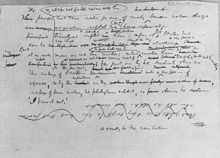- The Confidence-Man
-
The Confidence-Man Author(s) Herman Melville Country United States Language English Genre(s) Satire novel Publisher Dix, Edwards & Co. Publication date 1 April 1857 Media type Print (Hardback & Paperback) Pages 392 ISBN NA The Confidence-Man: His Masquerade was the last major novel by Herman Melville, the American writer and author of Moby-Dick. Published on April 1, 1857 (presumably the exact day of the novel's setting), The Confidence-Man was Melville's tenth major work in eleven years. The novel portrays a Canterbury Tales-style group of steamboat passengers whose interlocking stories are told as they travel down the Mississippi River toward New Orleans. After the novel's publication, Melville turned from professional writing and became a professional lecturer, mainly addressing his worldwide travels, and later for nineteen years a federal government employee. He continued to write poetry, but published no major prose work after The Confidence-Man.
Contents
Analysis
The novel's title refers to its central character, an ambiguous figure who sneaks aboard a Mississippi steamboat on April Fool's Day. This stranger attempts to test the confidence of the passengers, whose varied reactions constitute the bulk of the text. In this work Melville is at his best illustrating the human masquerade. Each person including the reader is forced to confront that in which he places his trust.
The Confidence-Man uses the Mississippi River as a metaphor for those broader aspects of American and human identity that unify the otherwise disparate characters. Melville also employs the river's fluidity as a reflection and backdrop of the shifting identities of his "confidence man."
The novel is written as cultural satire, allegory, and metaphysical treatise, dealing with themes of sincerity, identity, morality, religiosity, economic materialism, irony, and cynicism. Many critics have placed The Confidence-Man alongside Melville's Moby-Dick and "Bartleby the Scrivener" as a precursor to 20th-century literary preoccupations with nihilism, existentialism, and absurdism.
Melville's choice to set the novel on April Fool's Day underlines the work's satirical nature and potentially reflects Melville's worldview, once expressed in a letter to his friend Samuel Savage:
- It is—or seems to be—a wise sort of thing, to realise that all that happens to a man in this life is only by way of joke, especially his misfortunes, if he have them. And it is also worth bearing in mind, that the joke is passed round pretty liberally & impartially, so that not very many are entitled to fancy that they in particular are getting the worst of it.[1]
The work includes several satires of 19th century literary figures: Mark Winsome is based on Ralph Waldo Emerson while his "practical disciple" Egbert is Henry David Thoreau; Charlie Noble is based on Nathaniel Hawthorne; Edgar Allan Poe inspired a beggar in the story.[2]
Adaptations
The novel was turned into an opera by George Rochberg; it was premiered by the Santa Fe Opera in 1982, but was not held to be a success.[3]
References
- ^ Lynn Horth, ed. Correspondence. The Writings of Herman Melville: The Northwestern-Newberry Edition, Vol. 14, p. 203 (Letter of Aug. 24, 1851). Evanston, IL and Chicago: Northwestern University Press and The Newberry Library, 1993. ISBN 0-8101-0995-6
- ^ Delbanco, Andrew. Melville, His World and Work. New York: Alfred A. Knopf, 2005: 248. ISBN 0-375-40314-0
- ^ "Lost in the Desert", New York Magazine, August 23, 1982
External links
- The Confidence-Man at Project Gutenberg
- Critical reaction to and a publishing history of The Confidence-Man: His Masquerade from The Life and Works of Herman Melville
- Online text of the novel from the Electronic Text Center, University of Virginia Library
Works by Herman Melville Novels Typee: A Peep at Polynesian Life (1846) · Omoo: A Narrative of Adventures in the South Seas (1847) · Mardi: And a Voyage Thither (1849) · Redburn: His First Voyage (1849) · White-Jacket, or The World in a Man-of-War (1850) · Moby-Dick, or The Whale (1851) · Pierre: or, The Ambiguities (1852) · Isle of the Cross (ca 1853, lost) · Israel Potter: His Fifty Years of Exile (1856) · The Confidence-Man: His Masquerade (1857) · Billy Budd, Sailor (An Inside Narrative) (1924)Short story
collectionsThe Piazza Tales (1856)Short stories "The Piazza" · "Bartleby, the Scrivener" · "Benito Cereno" · "The Lightning-Rod Man" · "The Encantadas, or Enchanted Isles" · "The Bell-Tower" (all 1856) Uncollected : "Cock-A-Doodle-Doo!" (1853) · "Poor Man's Pudding and Rich Man's Crumbs" (1854) · "The Happy Failure" (1854) · "The Fiddler" (1854) · "Paradise of Bachelors and Tartarus of Maids" (1855) · "Jimmy Rose" (1855) · "The 'Gees" (1856) · "I and My Chimney" (1856) · "The Apple-Tree Table" (1856)
Unpublished in Melville's lifetime : "The Two Temples" · "Daniel Orme"Poetry Battle Pieces and Aspects of the War (1866) · Clarel: A Poem and Pilgrimage in the Holy Land (1876) · John Marr and Other Sailors (1888) · Timoleon (1891) · Weeds and Wildings, and a Rose or Two (1924)
Uncollected/unpublished poems: "Epistle to Daniel Shepherd" · "Inscription for the Slain at Fredericksburgh" · "The Admiral of the White" · "To Tom" · "Suggested by the Ruins of a Mountain-temple in Arcadia" · "Puzzlement" · "The Continents" · "The Dust-Layers" · "A Rail Road Cutting near Alexandria in 1855" · "A Reasonable Constitution" · "Rammon" · "A Ditty of Aristippus" · "In a Nutshell" · "Adieu"Essays Hawthorne and His Mosses (1850)Categories:- 1857 novels
- American novels
- Novels by Herman Melville
- 19th-century American novels
Wikimedia Foundation. 2010.

